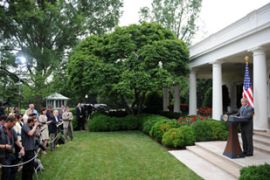US spy bill shields telecoms firms
Senate gives immunity to firms involved in Bush’s warrantless spying programme.

“This bill will help our intelligence professionals learn who the terrorists are talking to, what they’re saying and what they’re planing,” Bush said after the senate vote.
The new bill authorises US intelligence agencies to continue to eavesdrop, without court approval, on foreign targets believed to be outside the US.
The White House had threatened to veto the bill unless companies such as AT&T Inc. and Verizon Communications Inc were granted immunity from wiretapping lawsuits.
About 40 such cases have been filed, and all are pending before a single US district court.
‘Immeasurable tragedy’
Critics say that the bill fails to protect the privacy of Americans from government intrusion.
Kevin Bankston, senior staff attorney of the Electronic Frontier Foundation, a non-profit group campaigning to protect digital rights, said the passing of the bill was “an immeasurable tragedy”.
He said that the bill radically expanded “the president’s spying powers” and granted “immunity to the companies that colluded in his illegal surveillance programme”.
After the attacks on the US in 2001, Bush authorised the National Security Agency to eavesdrop on calls and email between the United States and abroad in cases that federal agents deemed may have a link to terrorism.
The spying, which was not revealed until 2005, went ahead without the permission of a special court set up to watch over government wiretapping operations.
Russ Feingold, a Democratic senator in Wisconsin, said: “This bill is not a compromise. It is a capitulation.”
“This president broke the law,” he said.
The Bush administration only brought the wiretapping back under the court’s authority only after The New York Times revealed the existence of the secret programme.